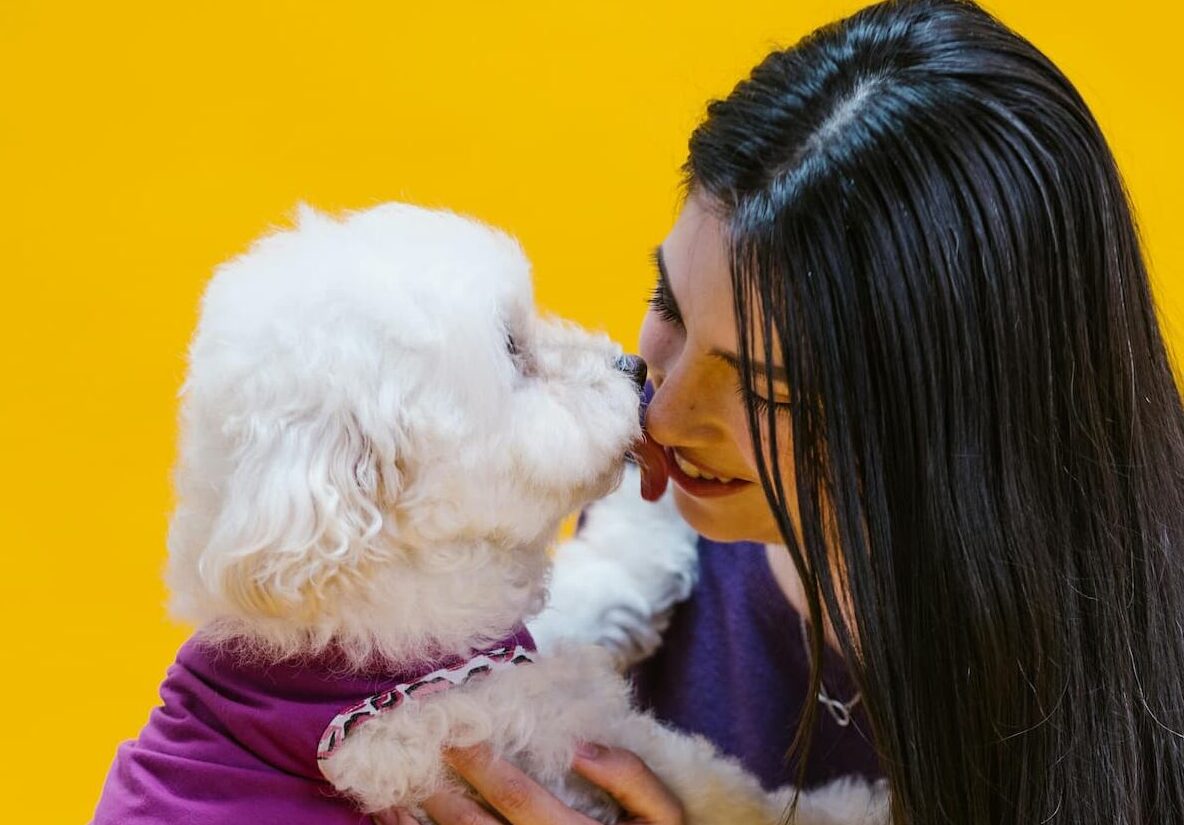Picture this: you’re sitting on the couch, engrossed in a book, when suddenly, your furry friend comes bounding over, tail wagging, ready to shower you with affection.
As you lean in for a cuddle, your dog’s wet tongue darts towards your ear.
Ah, the unmistakable tickle of a slobbery ear lick!
It’s both amusing and endearing, but have you ever wondered why dogs are drawn to our ears like magnets?
This article will answer the question: Why do our furry friends enjoy lavishing us with wet, sloppy ear kisses?
Why Do Dogs Like to Lick Ears?
Dogs have their own unique language when it comes to communication, and one interesting behavior that often leaves owners puzzled is ear licking.
You may have witnessed your furry friend vigorously licking another dog’s ears or even attempt to lick your own ears.
But why do dogs engage in this seemingly odd behavior?
Here are some of the roles ear-licking plays in canine communication:
1. Sign of affection: Licking is a natural way for dogs to show affection towards each other and their human companions.
It’s their way of saying, “I care about you!” When a dog licks another dog’s ears, it can be a sign of bonding and friendship.
The ritual of ear-licking is often reciprocal, with both dogs taking turns in grooming each other’s ears.
So, the next time you catch your pup giving your other four-legged friend a good ear-cleaning, remember that it’s their unique way of expressing love.
2. Establishing hierarchy: Dogs are social animals and have a natural inclination towards establishing hierarchies within their pack.
Ear-licking can serve as a way for a dominant dog to assert its authority over a more submissive one.
By licking another dog’s ears, the dominant dog is showing its superiority and reminding the submissive dog of its place in the pecking order.
It’s a subtle yet effective way for dogs to maintain harmony and order within their social structures.
3. Seeking attention or alleviating stress: In some cases, dogs may lick ears as a way to seek attention or relieve stress.
Dogs have taste receptors on their tongues, and the act of licking releases endorphins, which can have a calming effect on their emotional state.
So, if your pup is feeling anxious or uncertain, they may resort to licking their own ears or yours to self-soothe.
Additionally, ear-licking can be a strategy to grab your attention and get you to shower them with affection or offer reassurance during times of unease.
4. Exploring scents and tastes: Dogs have a refined sense of smell, and their tongues are not only for tasting but also for gathering information about the world around them.
When they lick your ear, they are not only detecting the unique scent that is specific to you but also exploring different tastes and textures.
They might detect unique smells like shampoo, earwax, or even the lingering fragrance of your favorite perfume!
It’s their way of learning more about their environment and the people or animals they interact with.
How Licking Ears Builds Trust and Affection
Here’s a closer look at the science behind ear-licking and how it plays a vital role in building trust and affection between dogs and their human companions.
1. Communication through scent: Dogs have an incredible sense of smell.
By licking ears, they are essentially sniffing and tasting the unique scent of their human’s earwax.
Pheromones are secreted in the earwax, and these chemical signals provide dogs with a wealth of information about their human’s emotions, health, and even identity.
So, next time your pup is giving your ear a thorough lick, remember that they’re trying to understand and connect with you on a whole new level.
2. Strengthening the bond: Licking ears is a behavior deeply ingrained in a dog’s ancestral history.
In a pack setting, dogs lick each other’s ears as a gesture of submission, respect, and affection.
By extending this behavior to their human companions, they’re signaling a strong bond and their willingness to accept you as part of their pack.
This act of trust-building strengthens the emotional connection between dogs and their owners, fostering a sense of security and companionship.
3. Promoting physical and emotional well-being: It’s not just about communication and bonding.
Licking ears can also have a soothing effect on dogs.
The act of licking releases endorphins in their brain, creating a sense of relaxation and pleasure.
In turn, this can help reduce stress, anxiety, and even alleviate physical discomfort.
So, the next time your furry friend gives your ear a gentle lick, remember that they are not only trying to communicate and build trust, but also showing their love and concern for your well-being.
Exploring the Health Benefits and Risks Associated with Dogs Licking Your Ears
Now that you understand why dogs like to lick your ears, here are some health benefits and risks associated with this behavior:
1. Communication and bonding
When a dog licks your ears, they may be trying to communicate with you.
Dogs use various forms of body language and touch to express emotions and establish a connection.
Licking the ears is a way for them to show trust and affection, just like kissing someone on the cheek.
It’s their special way of saying, “I care about you!”
So, next time your pooch tries to give your ears a bath, cherish the moment as it strengthens the bond you share.
2. Cleaning and grooming
Dogs have a keen sense of smell and are naturally drawn to scents.
Your ears might seem like an interesting source of intriguing smells to them.
Additionally, dogs have a grooming instinct, and licking is their way of keeping themselves and their loved ones clean.
The gentle motion of their tongue can remove dirt, debris, or even excess earwax from your ears.
While it may not exactly be the most glamorous beauty treatment, it’s a sign of their love and desire to care for you.
3. Potential health risks
Though doggy kisses can feel delightful, it’s important to be aware of the potential risks involved.
Dogs’ mouths harbor bacteria that may not be harmful to them but could be problematic for humans.
In rare cases, these bacteria can cause infections if they enter any irritated areas or cuts in the ear.
Additionally, excessive licking can lead to skin irritation or dermatitis, especially if the dog’s saliva stays on the skin for an extended period.
To ensure the well-being of both you and your furry friend, keep your ears clean, and if you notice any signs of irritation or infection, consult a healthcare professional.
Medical Worries, Dealing with Excessive Ear Licking
While a few affectionate licks on the ear are usually harmless and even enjoyable for some pet owners, excessive ear licking can be cause for concern.
It could indicate an underlying medical issue that requires attention.
If you notice your dog constantly licking their ears, it’s essential to take a closer look and monitor for any signs of irritation, redness, or discharge.
Excessive ear licking may be a symptom of an ear infection, allergies, parasites, or even anxiety.
If you suspect any discomfort or observe unusual behavior, it’s always advisable to consult a veterinarian to rule out any potential medical concerns.
Fun Activities to Distract Dogs from Ear Licking
Now that we understand why dogs like to lick ears, let’s discuss how to distract them from this behavior.
Creating alternative interactions and fun activities can redirect their attention and provide a healthy outlet for their energy.
Try engaging your dog in interactive play sessions with their favorite toys, such as a game of fetch or tug-of-war.
This not only serves as a great distraction but also provides mental and physical stimulation for your furry friend.
Additionally, consider incorporating puzzle toys or treat-dispensing toys into their routine to keep them entertained and mentally challenged.
These activities can help shift their focus from ear licking to playtime, ultimately promoting a happier and healthier pup.
FAQ
Q: What’s the deal with dogs and ear licking?
A: Well, dogs have an instinctive behavior to communicate and bond with their human counterparts.
Licking is a common form of social interaction for our four-legged companions, and it serves various purposes.
Q: Interesting! So, what are some reasons why dogs lick our ears?
A: Firstly, dogs love to show affection through licking.
Licking is a way for them to shower their humans with love, and ears just happen to be an accessible and convenient spot to lavish affection upon.
Q: Is there any scientific rationale behind this behavior?
A: Scientists believe that ear licking, beyond being a symbol of love, might have some ancestral roots.
In the wild, wolves and other dog relatives would lick the ears of their packmates to reinforce social bonds and establish trust.
This instinct might still be lingering in our domesticated buddies.
Q: But why ears specifically?
Aren’t there other ways dogs can show affection?
A: Absolutely!
Dogs may also lick other body parts like legs, hands, or faces.
However, the ears are quite the hotspot for our canine friends.
They’re rich in sweat and oil glands, which produce unique scents that can convey messages to dogs about our mood, health, and even identity.
So, it’s like a two-for-one deal for them – they get to show affection and gather information through a single lick.
Q: Does it mean something different when dogs lick each other’s ears?
A: Good catch!
Dogs licking each other’s ears is often a sign of submission or respect within their social hierarchy.
It’s like a polite gesture saying, “Hey, I acknowledge your authority, friend!”
So, when a dog licks our ears, they might be trying to show respect or see us as the pack leader.
Q: Are there any downsides to dogs licking our ears?
A: While ear licking is generally harmless, it’s essential to keep a few things in mind.
Dog saliva contains bacteria that could potentially cause minor infections or irritations, especially if you have sensitive skin or any open wounds.
Moreover, excessive ear licking can sometimes be a symptom of an underlying health issue in your pet, like allergies or itchy ears. It’s always a good idea to consult your vet if you notice any concerning signs.
Q: So, how can we handle our dogs’ ear licking habits?
A: The good news is, you can redirect this behavior if it bothers you.
Distraction and positive reinforcement techniques can help.
Offer your dog a chew toy or engage them in play whenever they start going for your ears.
Additionally, establishing clear boundaries through training can discourage excessive ear licking so that it occurs only when you’re comfortable with it.
Q: Got it! So, ear licking is just another way dogs show their affection and build bonds?
A: Precisely!
Our adorable canine companions have a unique way of expressing love, and ear licking is just one part of their repertoire.
Embrace the affection, but remember, it’s okay to set boundaries and redirect their enthusiasm to other forms of bonding.
After all, our love for dogs should be a barkin’ good time for both parties!
End Notes
From ancient instincts to simple expressions of love, our furry friends are driven by a myriad of reasons to lick our ears.
Next time Fido comes over for an ear-friendly encounter, remember that it’s not just about cleaning or taste—it’s a sign of affection and a way for dogs to communicate and bond.
And if they happen to go a little overboard, you can now understand the emotional motivation behind those slobbery licks.
Ultimately, it’s just one of the many quirks that make dogs such lovable companions.
So let’s embrace those adorable, wet nose-to-ear moments and appreciate the unique ways our furry friends show us their love.
After all, life would be a little less entertaining without their unexpected and delightful antics, wouldn’t it














